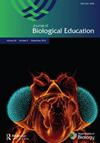What is ‘powerful knowledge’ in school biology?
IF 1.4
4区 教育学
Q3 BIOLOGY
引用次数: 1
Abstract
Powerful knowledge refers to specialised knowledge that provides generalisations, claims to be universal and provides a basis for making judgements. It originates from an academic discipline or disciplines, which is transformed into a school curriculum (Muller and Young 2019). Biology is a powerful discipline because it links related facts into concepts, which can themselves be linked into broader concepts and theories. It has transformative power because students can fit new observations into existing concepts, make conceptual connections, gain insights into their observations and generate ideas (Muller and Young 2019). Bildung-centred Didaktik expands the concept of powerful knowledge from ‘knowledge for its own end’ to ‘knowledge for developing human powers’. It foregrounds the educational potential of school subjects to form ‘autonomous and responsible individuals who can thrive and flourish in the present and future world’ (Deng 2022, 14). Geography leads the way in structuring and enacting a school curriculum for powerful knowledge (Maude 2016; Larsen and Solem 2022). Content selection and its sequencing to form a school subject are crucial to achieving progress in powerful knowledge (Muller and Young 2019; Deng 2022). This editorial aims to initiate discussion about what counts as ‘powerful knowledge’ in biology. There is general consensus that biology curriculum should address knowledge, skills, attitudes and values, with a view to promoting responsible decision-making about one’s own and environmental health (Harlen et al. 2015). It should include how biological processes can be used to benefit humans without harming the environment. There is also general consensus about the broad components of biology: cell biology, heredity, evolution, diversity, ecology, animal structure and function, and plant structure and function (Starr, Evers, and Starr 2016). The question is: how can we structure the components so that they build from facts through generalising concepts to broader concepts and theories? A group of scientists and science education experts identified four ‘big ideas’ in disciplinary biology towards which students should progress from ages 5 to 17. They then sequenced relevant content to suit the age and stage of schooling (Harlen et al. 2015). Their big ideas are:什么是学校生物中的“强大知识”?
强大的知识是指提供概括、声称具有普遍性并为做出判断提供基础的专业知识。它源于一个或多个学科,这些学科被转化为学校课程(Muller和Young 2019)。生物学是一门强大的学科,因为它将相关的事实与概念联系起来,而概念本身又可以与更广泛的概念和理论联系起来。它具有变革性的力量,因为学生可以将新的观察融入现有的概念,建立概念联系,深入了解他们的观察并产生想法(Muller和Young,2019)。以毕尔当为中心的迪达克提克将强大知识的概念从“为自身目的的知识”扩展为“发展人类力量的知识”。它突出了学校科目的教育潜力,以形成“自主和负责任的个人,他们能够在现在和未来的世界中茁壮成长”(邓2022,14)。地理在构建和制定强大知识的学校课程方面处于领先地位(Maude 2016;Larsen和Solem 2022)。内容选择及其形成学校科目的顺序对于在强大的知识方面取得进展至关重要(Muller和Young 2019;邓2022)。这篇社论旨在引发关于生物学中什么是“强大的知识”的讨论。人们普遍认为,生物学课程应涉及知识、技能、态度和价值观,以促进对自身和环境健康的负责任决策(Harlen等人,2015)。它应该包括如何在不损害环境的情况下利用生物过程造福人类。关于生物学的广泛组成部分:细胞生物学、遗传、进化、多样性、生态学、动物结构和功能以及植物结构和功能,也存在普遍共识(Starr、Evers和Starr,2016)。问题是:我们如何构建组件,使其从事实出发,通过概括概念到更广泛的概念和理论?一组科学家和科学教育专家确定了生物学学科的四个“大创意”,学生从5岁到17岁应该朝着这个方向发展。然后,他们对相关内容进行排序,以适应学校教育的年龄和阶段(Harlen等人,2015)。他们的大创意是:
本文章由计算机程序翻译,如有差异,请以英文原文为准。
求助全文
约1分钟内获得全文
求助全文
来源期刊
CiteScore
3.00
自引率
27.30%
发文量
68
审稿时长
>12 weeks
期刊介绍:
Journal of Biological Education is firmly established as the authoritative voice in the world of biological education.
The journal aims to bridge the gap between research and practice, providing information, ideas and opinion, in addition to critical examinations of advances in biology research and teaching. Through the coverage of policy and curriculum developments, the latest results of research into the teaching, learning and assessment of biology are brought to the fore.
Special emphasis is placed on research relevant to educational practice, guided by educational realities in systems, schools, colleges and universities. Papers that are theoretically informed and methodologically rigorous are welcomed.

 求助内容:
求助内容: 应助结果提醒方式:
应助结果提醒方式:


